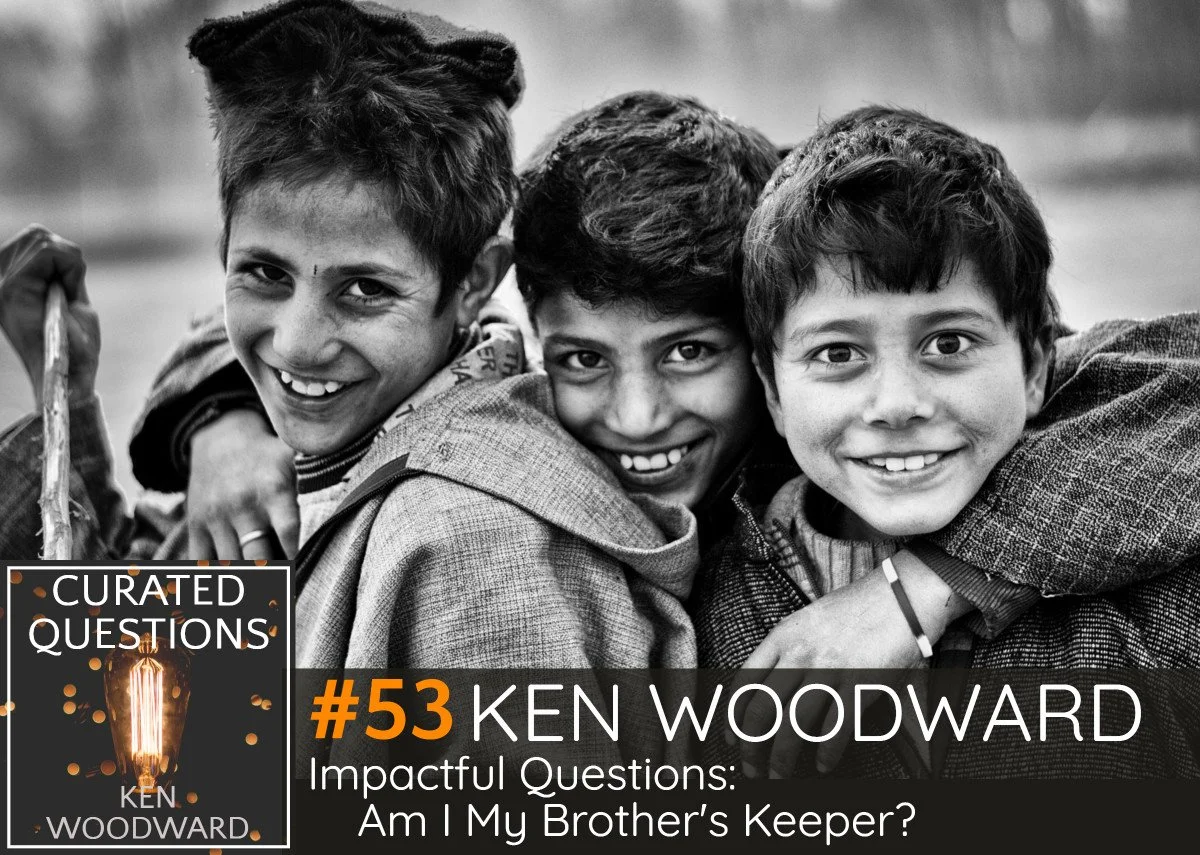"Am I my brother's keeper? Is answered in the daily work of showing up, being challenged, getting it wrong, being corrected, and showing up again." - Ken Woodward
"Am I my brother's keeper? Is answered in the daily work of showing up, being challenged, getting it wrong, being corrected, and showing up again." - Ken Woodward
In this solo episode, Ken Woodward explores one of humanity's oldest and most challenging questions: "Am I my brother's keeper?" Born from Cain's evasion after murdering Abel, this question continues to shape how we answer fundamental issues about immigration, homelessness, healthcare, and who deserves our care.
Drawing from his 101-week walk through every street and alley in Washington, DC, Ken reflects on how he spent 50 years answering "no" to this question while convincing himself he was answering "yes." He shares powerful conversations with Raymond Coates about the Sugar House in Charleston, encounters with a woman who demanded accountability, and the devastating costs of both saying yes and saying no.
This episode challenges listeners to examine their own complicity, confront inherited assumptions, and honestly assess who they've decided doesn't count as "brother." Ken offers four concrete takeaways to help transform this ancient question from theological abstraction into daily practice.
This Curated Questions episode can be found on all major platforms and at CuratedQuestions.com.
Keep questioning!
Episode Notes
00:00 The Work of a Brother's Keeper
01:12 Welcome to Curated Questions
01:50 Am I My Brother's Keeper
02:36 The Origin: Cain's Evasion
04:44 The Question I Avoided Asking
09:09 The Question I Lived
11:07 Who Counts As Brother?
14:21 What This Question Reveals
15:45 The Cost of Yes!
19:51 The Cost of No
23:50 the Present Moment
27:22 The Military Exception
28:42 Repentance & Reparation
32:35 The Vulnerability of Yes
34:00 The Question For You
36:58 The Invitation
38:41 Takeaway
43:27 Final Closing
Resources Mentioned
James Baldwin
Lies My Teacher Told Me: Everything Your American History Textbook Got Wrong by James W. Loewen
Caste: The Origins of Our Discontents by Isabel Wilkerson
The parable of the Good Samaritan
Jesus and the Disinherited by Howard Thurman
Raymond Coates
Sugar House, Charleston, South Carolina
Training Day with Denzel Washington
An Indigenous Peoples' History of the United States by Roxanne Dunbar-Ortiz
Questions Asked
Am I my brother's keeper?
Where is your brother Abel?
Who have I decided doesn't count?
Whose suffering have I accepted as normal?
Whose voice have I decided doesn't matter quite as much as others?
How am I actually answering this question with my life, not with my words?
Why didn't Black service members get access to the GI Bill after returning from World War II?
How is the Republican adoption of the Southern Strategy to disenfranchise Black voters starting in the 1950s still functioning?
How was a Black family supposed to build generational wealth when redlining was legal?
What do I do with the half that's correct?
Who is my neighbor?
How are people with their backs against the wall supposed to relate to Christianity when Christians have their boot on their necks?
Will my brother keep me?
How have you been complicit in creating the conditions you say you don't want?
You think that didn't affect him?
You think he went home and was a good father? A good husband?
You think that violence stayed contained in the Sugar House?
You think you got something to say, don't you?
Are you a racist?
What do you think about slavery?
What do you think about policing?
What about reparations?
What about income inequality?
What is this project going to accomplish?
How is this going to make a difference in my life?
Are you really my brother's keeper, or are you just performing?
What does repentance look like?
What does turning away from these sins look like?
What does making amends look like?
Who have you decided doesn't count as your brother?
How has your boundary line shifted over time?
Who is included that wasn't before, and who has now shifted beyond that border?
What would it cost you to say yes to someone you've been saying no to?
What are the things your grandparents taught you—not explicitly, but through silence, through who was welcome in your home, through what neighborhood you lived in—that were actually answering "no" to this question?
Which of those things are you still practicing?
Am I ready to become my brother's keeper?
What would it cost me to actually be this person's keeper?
What have I taught you, through my actions and choices rather than my words, about who counts as your brother?
Is that the inheritance you want from me?
